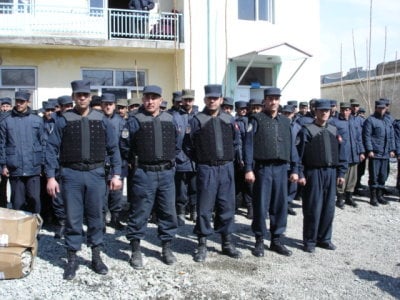An integral factor in the growth of a stable and prosperous Afghanistan is a functional and legitimate police force. One that the population could depend on to bring order and justice. The attainment of this has been a goal for the nascent Afghan government and international community and President Obama’s announced Afghan strategy put great focus on strengthening the Afghan military and police forces in the country by providing more trainers and resources.
While according to a new piece by Richard Oppel Jr. in the New York Times, there is a lot of work still to be done if progress is to be made, and even more important institutionalized, in this crucial arena. Oppel specifically investigated the Ghazni Province, interviewing various US and Afghan officials. Oppel lets these officials tell a same-old, same-old story of blatant corruption inside of the Afghan police force and how this has eroded support for the police among the local population.
He quotes First Sgt. John Strain, the senior noncommissioned officer on the American unit training the Ghazni police, who lays out his doubts about a more trustworthy and effective Afghan police force: “If we stay here another year, or another 50 years, I think it’ll probably only take two to three years after we are gone until it reverts to the way it was right before we got here.”
Oppel himself calls the corruption so bad that it ‘deeply undercuts’ efforts to improve the police and has destroyed many Afghans’ faith in government. He details the breadth of corruption reaching the highest levels of governance and trickling down to the cop on the beat. So many citizens of Ghazni and elsewhere in the country are faced with daily corruption and organized crime on a daily basis.

This is obviously a problem in that it erodes the citizen’s faith in governance and local police, but also in how it makes certain regions more pliable for a Taliban comeback. While their local police force and politicians may be inept and ‘on the take’, they know that the Taiban, though unpopular and harsh, could actually bring some semblance of order and justice to their community. This is issue is crucial then in building up support for the Kabul and local governance as well in undermining the legitimacy of the Taliban. The Taliban themselves know how important it is for them to undermine the government’s police forces as they have constantly attacked them trying to lower morale and show ‘who’s in charge’.
Weeding out corruption and organized crime that has penetrated most aspects of society is extremely difficult, but it has been done. While a researcher for the New York City Crime Commission, I read about several cases where small and large communities were able to root out incessant corruption and organized crime. One of the most inspire cases was in Palermo, Sicily, where with the help of a brave mayor and a few lawyers, the people of the city said ‘enough’ and made a concerted effort to weed out all embedded criminal elements.
Every case is different, but multiple cultures and societies have shown they can do it and so it can be done in Afghanistan. However, it will take a tremendous commitment from the Afghan government, the Afghan people, and from the international community. We will need to follow exactly how Obama’s new plan tackles this issue, but I know it will be targeted strongly. We can also hope that a President Karzai fighting for reelection will show his people a stronger, more resilient leader toward the corrupt officials around him.